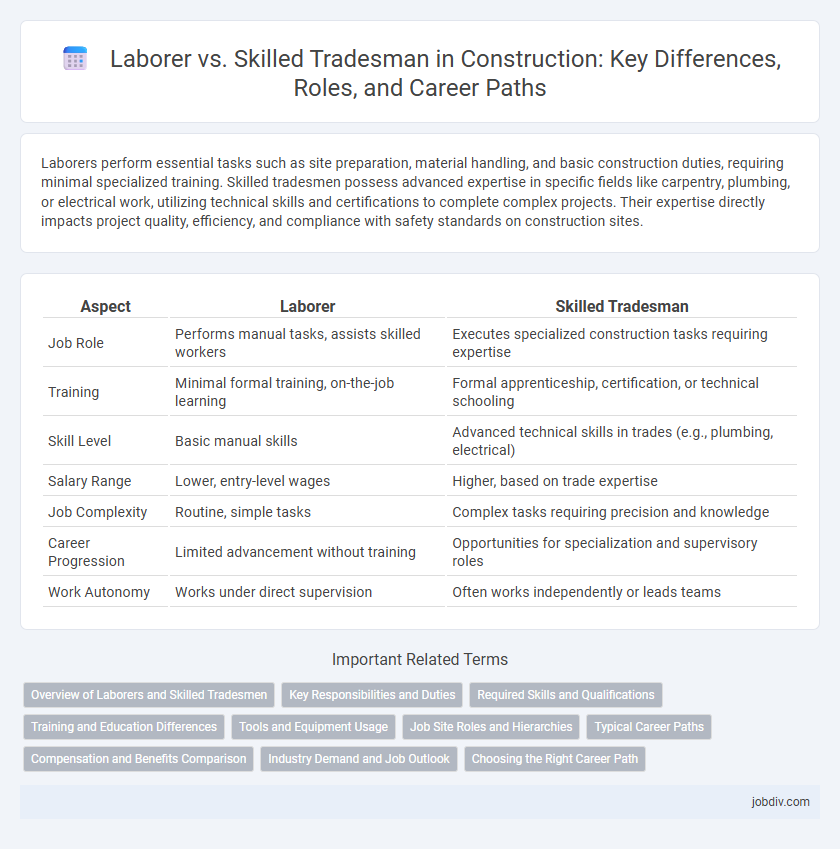Laborers perform essential tasks such as site preparation, material handling, and basic construction duties, requiring minimal specialized training. Skilled tradesmen possess advanced expertise in specific fields like carpentry, plumbing, or electrical work, utilizing technical skills and certifications to complete complex projects. Their expertise directly impacts project quality, efficiency, and compliance with safety standards on construction sites.
Table of Comparison
| Aspect | Laborer | Skilled Tradesman |
|---|---|---|
| Job Role | Performs manual tasks, assists skilled workers | Executes specialized construction tasks requiring expertise |
| Training | Minimal formal training, on-the-job learning | Formal apprenticeship, certification, or technical schooling |
| Skill Level | Basic manual skills | Advanced technical skills in trades (e.g., plumbing, electrical) |
| Salary Range | Lower, entry-level wages | Higher, based on trade expertise |
| Job Complexity | Routine, simple tasks | Complex tasks requiring precision and knowledge |
| Career Progression | Limited advancement without training | Opportunities for specialization and supervisory roles |
| Work Autonomy | Works under direct supervision | Often works independently or leads teams |
Overview of Laborers and Skilled Tradesmen
Laborers perform essential physical tasks on construction sites, such as loading materials, site cleanup, and assisting skilled tradesmen. Skilled tradesmen possess specialized expertise in areas like plumbing, electrical work, carpentry, and masonry, requiring formal training and certifications. The distinction lies in the complexity of tasks, with laborers providing general support and skilled tradesmen handling technical construction responsibilities.
Key Responsibilities and Duties
Laborers in construction primarily perform physical tasks such as site preparation, material handling, and equipment operation to support project progress. Skilled tradesmen possess specialized expertise in areas like carpentry, plumbing, or electrical work, executing technical tasks that require precision and adherence to building codes. Both roles are essential, with laborers ensuring the general workflow and skilled tradesmen delivering the craft quality necessary for structural integrity and compliance.
Required Skills and Qualifications
Laborers typically require basic physical stamina and a general understanding of construction site safety protocols, with minimal formal qualifications needed. Skilled tradesmen must possess specialized training and certifications such as apprenticeships or vocational licenses in trades like carpentry, plumbing, or electrical work, demonstrating advanced technical skills and knowledge. The distinction in qualifications directly impacts job responsibilities, wage levels, and career advancement opportunities within the construction industry.
Training and Education Differences
Skilled tradesmen undergo formal training programs, apprenticeships, and certifications that provide specialized knowledge in areas such as plumbing, electrical work, or carpentry. Laborers typically acquire on-the-job experience with minimal formal education or training, focusing on physical tasks and general site support. The advanced technical skills and certifications of skilled tradesmen often result in higher wages and greater job responsibilities compared to laborers.
Tools and Equipment Usage
Laborers primarily handle basic tools such as shovels, hammers, and wheelbarrows, assisting skilled tradesmen by preparing sites and moving materials. Skilled tradesmen operate specialized equipment including power drills, welding machines, and pneumatic tools, requiring extensive training to ensure precision and safety. Proficiency in using advanced machinery directly impacts the efficiency and quality of construction projects.
Job Site Roles and Hierarchies
Laborers on construction sites perform essential manual tasks such as loading, unloading, and site cleanup, supporting the overall workflow without specialized training. Skilled tradesmen, including electricians, plumbers, and carpenters, execute specific technical tasks requiring certification and expertise, often leading specialized teams. The job site hierarchy places skilled tradesmen above laborers, reflecting their advanced skills, greater responsibility, and higher pay scales within construction projects.
Typical Career Paths
Laborers often begin their careers with entry-level tasks and progress by gaining on-the-job experience or formal training to become skilled tradesmen, such as electricians, plumbers, or carpenters. Skilled tradesmen typically undergo apprenticeships or technical education, allowing them to specialize and advance into supervisory or project management roles within construction firms. Career growth in construction relies heavily on skill acquisition, certifications, and practical experience, distinguishing the typical paths for laborers and skilled tradesmen.
Compensation and Benefits Comparison
Laborers in construction typically earn lower wages compared to skilled tradesmen, with average hourly rates around $15 to $25 versus $25 to $45 for tradesmen such as electricians and plumbers. Skilled tradesmen also receive enhanced benefits, including comprehensive health insurance, retirement plans, and apprenticeship programs that support career advancement and job security. The compensation gap reflects the higher demand for specialized skills and certifications, validating the investment in training and expertise.
Industry Demand and Job Outlook
Skilled tradesmen are experiencing higher industry demand due to specialized expertise in areas such as electrical, plumbing, and carpentry, which require formal training and certifications. Laborers, while essential for various construction site tasks, face moderate job growth largely tied to overall construction activity levels and infrastructure projects. The job outlook favors skilled tradesmen with advancing technology and stricter building codes increasing reliance on certified professionals.
Choosing the Right Career Path
Laborers typically perform basic, physical tasks on construction sites requiring minimal specialized training, making entry into the field faster but offering limited skill development and wage growth. Skilled tradesmen, such as electricians, plumbers, or carpenters, undergo extensive training and apprenticeships, resulting in higher earning potential, job stability, and opportunities for career advancement. Choosing between a laborer and a skilled tradesman career path depends on individual goals related to training investment, long-term income, and desired expertise within the construction industry.
Laborer vs Skilled Tradesman Infographic

 jobdiv.com
jobdiv.com